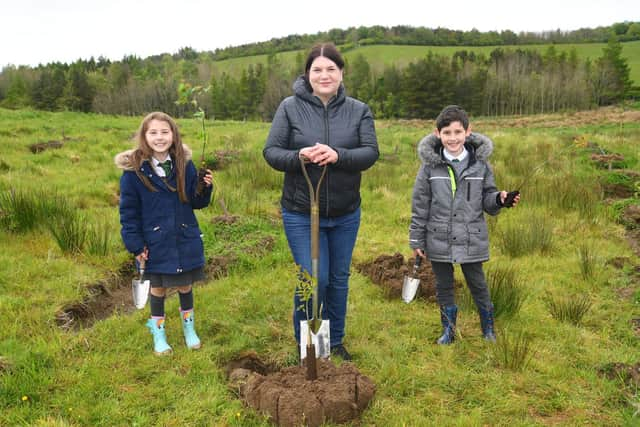Branching out: Ten trees to be planted for each Glaswegian in new 'urban woodland'
This will result in around 18 million new trees, increasing woodland cover in the region from 17 per cent to 20 per cent in ten years.
The pledge comes in a new proposal from Clyde Climate Forest, part of the Glasgow & Clyde Valley Green Network, which aims to breathe new life into neglected spaces and streets across eight local authorities in the region.
Advertisement
Hide AdAdvertisement
Hide AdPlanting will be carried out along the principle of ‘the right tree in the right place’, with new trees to go up in areas of deprivation, former coal-mining sites, vacant and derelict land, urban streets and other civic places.
Trees are one of the most effective natural means of sucking up harmful greenhouse gas emissions, which drive global warming.
Around 29,000 hectares of broadleaved woodland already exists in the area, but these are in fragmented patches due to urban development.
The new plans aim to connect these trees, helping to restore nature and boost biodiversity.
Councillor Susan Aitken, chair of Glasgow City Region cabinet and leader of Glasgow City Council, said: “New community woodlands, trees and forests will bring multiple benefits to our local communities as well as wildlife.


“The pandemic has brought into focus like never before the value of local spaces as places to exercise, de-stress and engage with nature, and this project can help to deliver the green recovery.”
Councillor Andrew Polson, joint leader of East Dunbartonshire Council and chair of the Land Use and Sustainability portfolio for Glasgow City Region, added: “Trees are nature’s own green lungs, improving the air that we breathe and soaking up harmful CO2 emissions from our environment.
“Expanding Glasgow City Region’s woodlands to create a new inter-connected forest will provide many lasting benefits.”
Advertisement
Hide AdAdvertisement
Hide AdThe move has been hailed as an ideal opportunity for Glasgow to demonstrate its commitment to worldwide carbon reduction targets, as the United Nations climate summit COP26 comes to the city in November.
Mairi McAllan, Scotland’s new minister for environment, biodiversity and land reform, said: “This is a significant and well-timed initiative, showcasing all that is good in tree-planting as we approach COP26.
“It is also a first for Scotland, with eight local authorities working together with government and other partners on a major woodland-creation initiative.
“Tree-planting is key to tackling the twin crises of climate change and biodiversity loss and there is tremendous support for it across Scotland.”
Clyde Climate Forest is being delivered as part of the Glasgow & Clyde Valley Green Network, with support from Green Action Trust, TCV, Glasgow City Region, Trees for Cities, Scottish Forestry and Woodland Trust Scotland.
The majority of planting will be state-funded through Scottish Forestry grant schemes but also via donations and other awards.
The project secured a £400,000 grant from the Woodland Trust’s Emergency Tree Fund as well as £150,000 from Scottish Forestry over the next two years to recruit a project team and kick-start the development of new planting schemes.
A message from the Editor:
Thank you for reading this article. We’re more reliant on your support than ever as the shift in consumer habits brought about by coronavirus impacts our advertisers.
If you haven’t already, please consider supporting our trusted, fact-checked journalism by taking out a digital subscription.
Comments
Want to join the conversation? Please or to comment on this article.
